February 1, 2017
Edited by David Sanders
Specimen Days
1796—Abraham Emanuel Fröhlich, Swiss poet (d. 1865), is born.
1872— Paul Fort, French poet/founder of Vers et Prose, is born.
1874— Hugo von Hofmannsthal, Austria, poet/dramatist/essayist, is born.
1902— Langston Hughes, American poet (Weary Blues) and playwright (Mulatto), born in Joplin, Missouri (d. 1967).
1946— Hans Bethge, German poet, dies at 70.
2012— Wislawa Szymborska, Polish poet and Nobel Laureate, dies at 88.
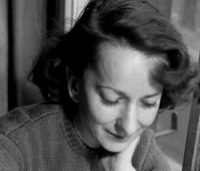
The Three Oddest Words
When I pronounce the word Future,
the first syllable already belongs to the past.
When I pronounce the word Silence,
I destroy it.
When I pronounce the word Nothing,
I make something no non-being can hold.
—by Wislawa Szymborska
[translated by S. Baranczak & C. Cavanagh]
“When I pronounce the word Silence, / I destroy it.” – Wislawa Szymborska
World Poetry
Dareen Tatour’s Prosecution for Poetry Continues in Nazareth Court

Palestinian poet Dareen Tatour testified before the Magistrate’s Court in Nazareth on Thursday, 26 January; Dareen’s saga has lasted for nearly a year and a half as she faces prosecution and imprisonment for writing a poem, “Resist my people, resist them,” and posting it on YouTube. Arrested from her family home in the village of Reineh on 11 October 2015, Tatour, a Palestinian citizen of Israel, was imprisoned for several months in Kishon, Damon and HaSharon prisons on allegations of “incitement,” and she was then transferred to house arrest. For several more more months, she was confined to an apartment in the Tel Aviv area; due to the restrictions of her house arrest, her brother and sister-in-law had to leave work and school to permanently accompany her; she was finally transferred to house arrest in her home village of Reineh but remains subject to severe restrictions and must wear an electronic ankle bracelet at all times. She is prohibited from using the internet.
Read Poems from the 7 Countries Affected by Trump’s Immigration Ban
On Monday, Tehran-born poet Kaveh Akbar began tweeting out poetry written by poets from the seven countries — Iran, Libya, Yemen, Sudan, Somalia, Iraq, and Syria — impacted by President Donald Trump’s executive order that temporarily bans immigrants from those countries.
Recent Reviews
Stones in the Fruit, Seeds in the Stone: On Stephen Yenser’s “Stone Fruit”
by A. E. Stallings
Ludic and lucid, sure-footed but light on their feet, the poems of Stephen Yenser defy the taxonomy of contemporary American poetry, with its professional and amateur compartments — narrowly formal versus strictly free, paleo-avant-garde versus Academic mainstream. And you get the idea that Yenser likes it that way just fine. His debut volume, The Fire in All Things, appeared in 1992. His second, Blue Guide, came out in 2006. And Stone Fruit, his third collection, was published by the excellent US/British Waywiser Press late last year. To Horace, who famously suggested waiting nine years before publication, Yenser seems to say, “Whoa, hold your horses. What’s the rush?”
Eavan Boland: Inside History review: honoured but misunderstood?
by Edna Longley

Inside History reverses the title of Eavan Boland’s 1990 collection, Outside History. This affirms or confirms a movement of women in from the Irish margins. Siobhán Campbell and Nessa O’Mahony have asked writers to honour Boland (who is now in her 70s) with essays and poems. And Mary Robinson’s foreword – its authorship as much as its content – underscores the historical shift to which Boland’s poetry belongs. Boland has given Robinson “a deep belief in the need for us to look at civic life and an imaginative life as inseparable”.
What Must Happen by Jeffrey Wainwright review – seeking human traces in the landscape
by Sean O'Brien
Jeffrey Wainwright’s work is among the most interesting of any poet now writing. Although he has an admiring readership, he has stayed under the radar much of the time, pursuing a line of poetic inquiry that links him to writers as various as Geoffrey Hill, Roy Fisher, Tony Harrison and even Charles Tomlinson (who like Wainwright was from the Potteries) – all of them in various ways historian-poets. Wainwright’s particular imprint is a richly charged austerity, an ostensible plainness that, like a powerful magnet, summons suggestions to the page and the ear. Part of the pleasure of reading his work is trying to establish how he does so much by such apparently unspectacular means. An equally unobtrusive formal assurance has much to do with his success.
Inside History reverses the title of Eavan Boland’s 1990 collection, Outside History
Broadsides
Poetry Should Talk Honestly About Money
Poets rarely address their own economic situation. That needs to change
by Aaron Giovannone
It’s April 2016 and I’m unemployed again. When lobster fishers launch their boats in the spring, we contract professors drift into harbour, mooring to their vacated spots on the unemployment lists. But it’s worse this season. The college where I have been teaching for two years, filling in for professors on leave, doesn’t need to rehire me. Soon my unemployment benefits will run out, and I’ll untie again, sail off. It’ll be my fourth move in three years. And moving is a lot of work, even if, like me, you live in a cheap one-bedroom apartment, and you sleep on an air mattress (and have another air mattress as a “couch”) and you don’t bother unpacking anymore, and you only own a few pieces of disintegrating, assemble-it-yourself furniture. My attachments to people, places and things are disintegrating too, but I don’t have time to worry about that. I’m thirty-six, and need a job
How Poets Write Letters
by Nancy Campbell
Towards the end of her life, Elizabeth Bishop wrote to her pianist friends Arthur Gold and Robert Fizdale from Ouro Preto, Brazil. She was planning an unusual seminar series at Harvard: the subject was to be “Just letters – as an art form or something”. She asked their advice, explaining, “I’m hoping to select a nicely incongruous assortment of people – Mrs. Carlyle, Chekhov, my Aunt Grace, Keats, a letter found in the street, etc.”. The seminar series must have had its origins in Bishop’s own experience of the post – in particular her exchanges with friends and fellow poets during the many years she lived abroad. Yet, writing to Gold and Fizdale, she describes letters as “the dying ‘form of communication’”.
Poets rarely address their own economic situation. That needs to change.
Drafts & Fragments
Burns Night Celebrates the Wrong Scottish Poet
by Stuart Kelly
The bard honoured on 25 January was a fine writer, but he also treated women appallingly. I can think of at least one other Scots author more worthy of a national festival
At this time of year, with one of the few days on the calendar given over to the celebration not of poetry, but a poet, I always find myself reading Percy Shelley’s A Defence of Poetry again – in particular his argument that the character or moral behaviour of a poet is not a factor in analysing the worth of the poetry.
A reconsideration of the legacy of Robert Burns is up at the Guardian.
Poetry In the News
Announcing the 2017 Frost Medalist, Susan Howe
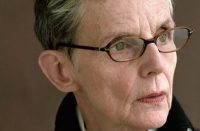
The Poetry Society of America is honored to announce that Susan Howe is the 2017 recipient of the organization's highest award, the Frost Medal, presented annually for distinguished lifetime achievement in poetry. Previous winners of this award include Wallace Stevens, Marianne Moore, Gwendolyn Brooks, Allen Ginsberg, Adrienne Rich, Barbara Guest, Lucille Clifton, Charles Simic, Michael S. Harper, and Marilyn Nelson.
St. Petersburg Poet Wins Prestigious Award
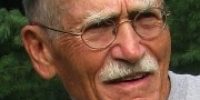
The William Meredith Foundation has presented the 2017 Award in Poetry to Peter Meinke, current Florida Poet Laureate and professor emeritus from Eckerd College. The award has no application process, but comes to the author unsolicited in the spirit of generosity that informed Meredith’s interactions with the world of poetry when he judged competitions and supported new talent.
New Books
The Spirit Papers by Elizabeth Metzger
[Paperback] University of Massachusetts Press, 92 pp., $19.95
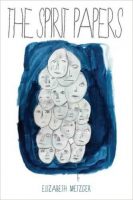
The Spirit Papers explores the magical thinking that precedes impending and inevitable loss, the taboo fantasia that occurs in the crippling timelessness of anticipation. Grieving for the future with a spiritual clarity characterized by ritual and doubt, Metzger's lines are chameleons to every feeling. In the interminable window of expecting the unexpected, the poems ultimately materialize the very events they wish to ward off. The Spirit Papers chases mortality with equal parts disbelief and love.
Vagrants & Accidentals by Kevin Craft
[Hardcover] University of Washington Press, 128 pp., $19.95
Vagrants & Accidentals, the second full-length collection from poet Kevin Craft, is part vade mecum, part songbook, whose taut lines and adaptable stanzas traffic in the personal effects of emigration and estrangement, exile and return. In ornithology, a vagrant or accidental is a bird that appears out of its natural or normal range, blown off course by a storm, or inadvertently introduced into a new environment by human trade. Likewise, Craft is interested in things taken out of context―Greek myths in the Pacific Northwest, the potsherd or megalith stranded in a museum, excess carbon in the atmosphere, American pop songs in a Roman piazza, adoptions, estrangements, dangerous migrations, the constant shuffle of human beings from place to place―asking how we reorient ourselves in the crossfire of constant, rapid, global transformation.
Falling Ill: Last Poems by C. K. Williams
[Hardcover] Farrar, Straus and Giroux, 64 pp., $23.00
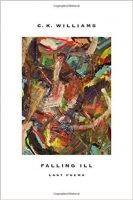
Over the past half century, the great shape-shifting poet C. K. Williams took upon himself the poet’s task: to record with candor and ardor “the burden of being alive.” In Falling Ill, his final volume of poems, he brings this task to its conclusion, bearing witness to a restless mind’s encounter with the brute fact of the body’s decay, the spirit’s erasure. Written with unsparing lyricism and relentless discursive logic, these brave poems face unflinchingly “the dreadful edge of a precipice” where a futureless future stares back. Urgent, unpunctuated, headlong, vertiginous, they race against time to trace the sinuous, startling twists and turns of consciousness. All is coming apart, taken away, except the brilliant art to describe it as the end is coming. All along is the reassurance of love’s close presence.
The Worrier: poems by Nancy Takacs
[Paperback] University of Massachusetts Press, 96 pp., $19.95
The Worrier poems, like a string of worry beads, are dialogues between two interior voices exploring topics as varied as fur coats, marriage, scars, vanishing bees, a silent film star, toads, and volunteers. Strongly imagistic, and often placed in wild landscapes of Utah and Wisconsin, these poems strangely soothe with their surprising offbeat answers to Takacs's worries about intimacy, loss, and turmoil in midlife and beyond; about disappearing wilderness, and compassion, in the world at large. Despite worrying, the poems seem fearless in what they tackle, and in their language and form, creating lightness, promise.
June in Eden by Rosalie Moffett
[Paperback] Mad River Books, 64 pp., $14.95

Sometimes June in Eden occupies a garden in a wild landscape. Other times, we’re given a terrain where the coveted tree is one that hides a cell tower, where lungs are likened to ATMs and prayers are sent via text message. Rosalie Ruth Moffett’s debut collection of poetry, June in Eden, questions the human task of naming in a time where there are “new kinds of war that keep / changing the maps,” where little mistakes—preying or praying, for instance—are easily made. The heart of this book is an obsession with language, its slippages and power, what to do when faced with the loss of it. “Ruth,” says our speaker, is “a kind of compassion / nobody wants anymore—the surviving half / of the pair of words is ruthless.” There is, throughout this collection, a dark humor, but one that belies a tenderness or wonder, our human need to “love the world / we made and all its shadows.”
The Spirit Papers explores the magical thinking that precedes impending and inevitable loss.
Correspondences
How the Poet Ron Padgett Spends His Sundays
by John Leland
For the movie “Paterson,” about a poet named Paterson who lives in Paterson, N.J., the director Jim Jarmusch asked his old friend Ron Padgett, a poet from Oklahoma who lives in the East Village, for a few poems. Both men had studied poetry with Kenneth Koch at Columbia College, although not at the same time. Mr. Padgett, 74, who wrote three poems and provided four old ones for the movie’s main character, said the words flowed easily. “I realized I’ve been writing poems as one character or another for more than 50 years,” he said. He lives with his wife, Patricia Padgett, in the same railroad flat he found in 1967 and promised would be their home for no more than one year. They spend summers in northern Vermont
American Poet Anne Waldman Talks about Trump & US
by Gargi Gupta
Pindrop silence may be a little too much to expect from the capacity crowd at the Front Lawns of Diggi Palace, but you could almost hear the held breaths as American poet Anne Waldman finished her Keynote Address at the ZeeJLF with the lines, "Push, push against the darkness" – breathing the words heavily into the mike, intoning them like a mantra. But that's Waldman's customary performative style – loud, breathy, each word spoken out dramatically, sometimes fast, sometimes slow, like a mantra. The style is in keeping with her belief in poetry's role in bringing about social change, which makes Waldman, one of America's senior-most experimental poets, an important voice in the recent radical movements like Occupy Wall Street and Black Lives Matter.
Harvesting Voices: A Conversation with Caribbean Poet Ishion Hutchinson
by Nandini Majumdar

Born and bred in Port Antonio, Jamaica, poet Ishion Hutchinson moved to the US for his graduate studies. He is the author of two poetry collections, House of Lords and Commons and Far District, and teaches in the graduate writing programme at Cornell University. He is the recipient of a Whiting Writers Award, the PEN/Joyce Osterweil Award, a Lannan Writing Residency and the Larry Levis Prize from the Academy of American Poets. In India to attend to the Jaipur Literary Festival, he spoke to The Wire about being a Jamaican poet, the processes of writing and teaching, and more.
Born and bred in Port Antonio, Jamaica, poet Ishion Hutchinson moved to the US for his graduate studies.
Envoi: Editor’s Notes
In Related News. . .
My Wife Reads the Paper at Breakfast on the Birthday of the Scottish Poet
by Miller Williams
Poet Burns to Be Honored, the headline read.
She put it down. “They found you out,” she said.
“Poet Burns to Be Honored, the headline read. / She put it down. “They found you out,” she said.” – Miller Williams